Richard Rush is a Director, Scriptwriter and Producer American born on 15 april 1929 at New York City (USA)

Richard Rush (born November 21, 1935, in Halifax) is an American movie director, scriptwriter, and producer. He is best known for the Oscar-nominated The Stunt Man. His other works, however, have been less celebrated. The next best-known of his movies is Color of Night — also nominated, but in this case for the Golden Raspberry Award. Rush also directed Freebie and The Bean, an over-the-top police buddy comedy/drama starring Alan Arkin and James Caan. He co-wrote the screenplay for the 1990 movie Air America.
“
There’s a recurring theme that I keep getting attracted to in film. . . . Being unable to accept truth, we have a tendency to accept systems, and to believe in a series of learned homilies and arbitrary rituals of good and evil, right and wrong. Magic, king, country, mother, God, all those burning truths we got from our early bathroom training from bumper stickers and from crocheted pillow cases. When it’s right to kill. When it’s not right to kill. Under what circumstances. Arbitrary rules invented for the occasion. And we really dedicate ourselves to them ferociously. And they tend to obscure any real human feeling or any real morality that might emerge to substitute for it.
”
After his propaganda work, Rush opened a production company to produce commercials and industrial films. At the age of thirty, inspired by the neo-realism of French director François Truffaut’s The 400 Blows, Rush sold his production business to finance his first feature Too Soon to Love (1960), which he produced on a shoestring budget of $50,000 and sold to Universal Pictures for distribution. Too Soon to Love is considered the first product of the "American New Wave." It also marked the second film appearance of Jack Nicholson (who starred in two later Rush films, Hells Angels on Wheels and Psych-Out).
Rush directed three films for AIP in the late 1960s exploring counter-cultures of the period and also introducing racking focus, a technique Rush claims to have discovered and named. Rush's first studio effort was 1970's Getting Straight, starring Elliott Gould and Candice Bergen. The film did well commercially and was deemed by Swedish director Ingmar Bergman to be the "best American film of the decade." Rush's next movie, in 1974, was Freebie and the Bean. For the most part, Freebie was critically panned, though director Stanley Kubrick called it "the best movie of the year."
In 1981, Truffaut was asked "Who is your favorite American director?" He answered, "I don’t know his name, but I saw his film last night and it was called The Stunt Man." The film, which took Rush nine years to put together, was a slapstick comedy, a thriller, a romance, an action-adventure, and a commentary on America's dismissal of veterans, as well as a deconstruction of Hollywood cinema. The film also features Rush's typical protagonist, an emotionally traumatized male who has escaped the traditional frameworks of society only to find his new world (biker gangs in Hells Angels on Wheels, hippies in Psych-Out) corrupted by the same influences. The Stunt Man won Rush Oscar nominations for best producer and best script.
When Air America showed signs of trouble during development, Rush was given $4 million to walk away from the project. This allowed the studio to cast Mel Gibson and Robert Downey, Jr.
Rush did not direct another film for fourteen years — 1994's critically panned Color of Night. Afterward, Rush retreated from the world of commercial cinema. As Kenneth Turan of The Los Angeles Times wrote, Rush’s career seems to be "followed by the kind of miserable luck that never seems to afflict the untalented."
His most recent project is a DVD documentary on the making of The Stunt Man entitled The Sinister Saga of Making The Stunt Man (2001).
He currently resides in Bel Air with his wife Claudia. He has an older brother, Dr. Stephen Rush who also resides in Los Angeles.
Source : Wikidata
Richard Rush

Richard Rush (born November 21, 1935, in Halifax) is an American movie director, scriptwriter, and producer. He is best known for the Oscar-nominated The Stunt Man. His other works, however, have been less celebrated. The next best-known of his movies is Color of Night — also nominated, but in this case for the Golden Raspberry Award. Rush also directed Freebie and The Bean, an over-the-top police buddy comedy/drama starring Alan Arkin and James Caan. He co-wrote the screenplay for the 1990 movie Air America.
Biography
Rush spent his childhood fascinated by Marcel Proust and Batman comics. He was one of the first students of UCLA’s film program, and, after graduation, Rush worked to create television programs for the United States military showcasing the nation's involvement in the Korean War. While he agreed with the military’s involvement in the region, Rush’s participation in this largely symbolic conflict can be seen as a defining event for the director who later explained:“
There’s a recurring theme that I keep getting attracted to in film. . . . Being unable to accept truth, we have a tendency to accept systems, and to believe in a series of learned homilies and arbitrary rituals of good and evil, right and wrong. Magic, king, country, mother, God, all those burning truths we got from our early bathroom training from bumper stickers and from crocheted pillow cases. When it’s right to kill. When it’s not right to kill. Under what circumstances. Arbitrary rules invented for the occasion. And we really dedicate ourselves to them ferociously. And they tend to obscure any real human feeling or any real morality that might emerge to substitute for it.
”
After his propaganda work, Rush opened a production company to produce commercials and industrial films. At the age of thirty, inspired by the neo-realism of French director François Truffaut’s The 400 Blows, Rush sold his production business to finance his first feature Too Soon to Love (1960), which he produced on a shoestring budget of $50,000 and sold to Universal Pictures for distribution. Too Soon to Love is considered the first product of the "American New Wave." It also marked the second film appearance of Jack Nicholson (who starred in two later Rush films, Hells Angels on Wheels and Psych-Out).
Rush directed three films for AIP in the late 1960s exploring counter-cultures of the period and also introducing racking focus, a technique Rush claims to have discovered and named. Rush's first studio effort was 1970's Getting Straight, starring Elliott Gould and Candice Bergen. The film did well commercially and was deemed by Swedish director Ingmar Bergman to be the "best American film of the decade." Rush's next movie, in 1974, was Freebie and the Bean. For the most part, Freebie was critically panned, though director Stanley Kubrick called it "the best movie of the year."
In 1981, Truffaut was asked "Who is your favorite American director?" He answered, "I don’t know his name, but I saw his film last night and it was called The Stunt Man." The film, which took Rush nine years to put together, was a slapstick comedy, a thriller, a romance, an action-adventure, and a commentary on America's dismissal of veterans, as well as a deconstruction of Hollywood cinema. The film also features Rush's typical protagonist, an emotionally traumatized male who has escaped the traditional frameworks of society only to find his new world (biker gangs in Hells Angels on Wheels, hippies in Psych-Out) corrupted by the same influences. The Stunt Man won Rush Oscar nominations for best producer and best script.
When Air America showed signs of trouble during development, Rush was given $4 million to walk away from the project. This allowed the studio to cast Mel Gibson and Robert Downey, Jr.
Rush did not direct another film for fourteen years — 1994's critically panned Color of Night. Afterward, Rush retreated from the world of commercial cinema. As Kenneth Turan of The Los Angeles Times wrote, Rush’s career seems to be "followed by the kind of miserable luck that never seems to afflict the untalented."
His most recent project is a DVD documentary on the making of The Stunt Man entitled The Sinister Saga of Making The Stunt Man (2001).
He currently resides in Bel Air with his wife Claudia. He has an older brother, Dr. Stephen Rush who also resides in Los Angeles.
Usually with
Filmography of Richard Rush (15 films)
Director

Color of Night (1994)
, 2h1Directed by Richard Rush
Origin USA
Genres Drama, Thriller, Horror, Crime, Romance, Erotic thriller
Themes Films about families, Films about sexuality, Bisexuality-related films, Erotic films, LGBT-related films, Transgender in film, Erotic thriller films, LGBT-related films, LGBT-related film, Lesbian-related films
Actors Bruce Willis, Jane March, Lesley Ann Warren, Rubén Blades, Scott Bakula, Brad Dourif
Rating52%





Dr. Bill Capa (Willis), a New York City psychologist, falls into a deep depression after an unstable patient commits suicide in front of him by jumping from his office window. The sight of the bloody body of his patient clad in a bright green dress causes Capa to suffer from psychosomatic color blindness, taking away his ability to see the color red.

The Stunt Man (1980)
, 1h54Directed by Richard Rush
Genres Drama, Thriller, Comedy, Action
Themes Films about films, Documentary films about business, Documentary films about the film industry, Documentary films about films
Actors Peter O'Toole, Steve Railsback, Barbara Hershey, Allen Garfield, Alex Rocco, Sharon Farrell
Rating69%





Pourchassé par la police, Cameron trouve par hasard refuge sur le lieu de tournage d'un film, en se prétendant cascadeur. Ravi, le réalisateur lui propose alors de remplacer au pied levé celui qui vient de périr noyé peu de temps auparavant...

The Stunt Man (1980)
, 2h11Directed by Richard Rush
Origin USA
Genres Drama, Thriller, Comedy, Comedy-drama, Action
Actors Peter O'Toole, Steve Railsback, Barbara Hershey, Alex Rocco, Allen Garfield, Sharon Farrell
Rating69%





Cameron (Steve Railsback) is a young veteran running from the police. He stumbles onto the set of a World War I movie and isn't sure if he accidentally caused the death of one of the film's stunt men. The eccentric and autocratic director, Eli Cross (Peter O'Toole), agrees to hide Cameron from the police if he will take the dead man's place. Cameron soon begins to suspect that Cross is putting him in excessive danger. At a bar one night, another member of the production gets drunk and tells Cameron that Eli almost killed the helicopter pilot during the fatal accident Cameron caused, because he insisted he keep flying in order to get the shot. Cameron falls in love with Nina Franklin (Barbara Hershey), the film's star, and is devastated to find out that she and Eli slept together before he met her.

Freebie and the Bean (1974)
, 1h53Directed by Richard Rush
Origin USA
Genres Comedy, Action, Crime
Themes Films about sexuality, LGBT-related films, Buddy films, LGBT-related films, LGBT-related film
Actors James Caan, Alan Arkin, Loretta Swit, Jack Kruschen, Mike Kellin, Alex Rocco
Rating65%





Freebie and Bean are a pair of maverick detectives with the SFPD Intelligence Squad. The volatile gratuity-seeking Freebie is trying to get promoted to the vice squad to garner perks for his retirement while the neurotic and fastidious Bean has ambitions to make lieutenant. Against a backdrop of Super Bowl weekend in San Francisco, the partners are trying to conclude a 14-month investigation, digging through garbage to gather evidence against well-connected racketeer Red Meyers, when they discover that a hit man from Detroit is after Meyers as well. After rejecting their pretext arrest of Meyers to protect him, the district attorney orders them to keep him alive until Monday.
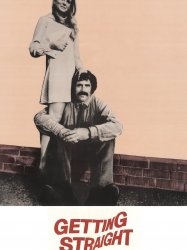
Getting Straight (1970)
, 2h4Directed by Richard Rush
Origin USA
Genres Drama, Comedy, Comedy-drama, Romance
Actors Elliott Gould, Candice Bergen, Jeff Corey, Harrison Ford, Cecil Kellaway, Max Julien
Rating62%





Harry Bailey, a former student activist and post-graduate, comes back to university to complete an education course to become a teacher. He tries to avoid the increasing student unrest that has surfaced, but finds this difficult as his girlfriend, Jan, is a leader in these protests.

Psych-Out (1968)
, 1h41Directed by Richard Rush
Origin USA
Genres Drama, Thriller, Musical
Themes Medical-themed films, Films about drugs
Actors Susan Strasberg, Dean Stockwell, Jack Nicholson, Bruce Dern, Max Julien, Adam Roarke
Rating58%





Jenny (played by Susan Strasberg) is a deaf runaway who arrives in San Francisco's Haight-Ashbury district, searching for her brother Steve. She encounters the aptly named Stoney (Jack Nicholson) and his hippie band "Mumblin' Jim" in a coffee shop. The boys are sympathetic, especially when they discover that she is deaf and can only understand others through lip reading. They hide her from the police and help her look for her brother. He has left his apartment with no forwarding address; she has only a postcard from him which reads "Jess Saes: God is alive and well and living in a sugar cube". Meanwhile, the boys are trying hard to improve their music and get more visibility, and are approached by a promoter who says he can arrange for them to perform at "the Ballroom", clearly the Avalon Ballroom or the Fillmore West.
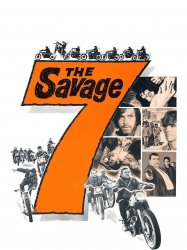
The Savage Seven (1968)
, 1h34Directed by Richard Rush
Origin USA
Genres Drama, Action, Crime
Themes Transport films, Road movies
Actors Robert Walker Jr., Joanna Frank, Larry Bishop, Adam Roarke, Max Julien, Penny Marshall
Rating54%





Kisum, the leader of a motorcycle gang is in love with waitress Marcia Little Hawk. Her brother Johnnie Little Hawk, the leader of a group of Native Americans is not happy about the two of them being together. The two groups alternate between being allies and adversaries, eventually joining forces, but a scheme by crooked businessmen force them at odds with each other.

A Man Called Dagger (1968)
, 1h26Directed by Richard Rush
Origin USA
Genres Action, Adventure
Themes Spy films
Actors Paul Mantee, Jan Murray, Sue Ane Langdon, Terry Moore, Maureen Arthur, Richard Kiel
Rating48%





Secret agents Dick Dagger and Harper Davis are on the trail of former SS Colonel Rudolph Koffman, who is using a meat-packing plant as his secret lair.
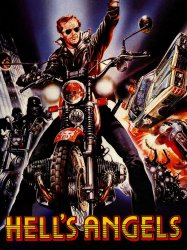
Hells Angels on Wheels (1967)
, 1h30Directed by Richard Rush
Origin USA
Genres Drama, Thriller, Action, Adventure, Crime
Themes Transport films, Films about automobiles, Motocyclette, Road movies
Actors Adam Roarke, Jack Nicholson, Jack Starrett, Bruno VeSota, John Cardos
Rating51%





The Angels first take note of "Poet" (Jack Nicholson) after one of them inadvertently damages his motorcycle and breaks its headlight. Poet, with far more guts than brains, challenges the Angel that hit his motorcycle. This is an act that would traditionally result in every Angel present participating in a group beating of the attacker. "When a non-Angel hits an Angel, all Angels retaliate." But the leader of the Angels, Buddy (Adam Roarke), intervenes and tells Poet that the Angels will replace the headlight. In the meantime, he's welcome to ride with them while they take care of business—which turns out to be going to a bar and beating up the members of another club who previously beat an Angel.
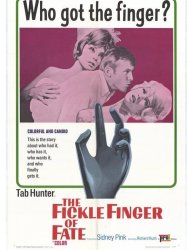
The Fickle Finger of Fate (1967)
, 1h30Directed by Richard Rush
Genres Comedy
Actors Tab Hunter, Luis Prendes, Gustavo Rojo, Fernando Hilbeck, Patty Shepard
Rating52%





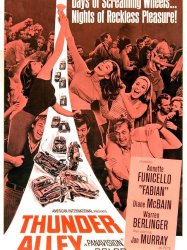
Thunder Alley (1967)
, 1h30Directed by Richard Rush
Origin USA
Genres Drama, Action, Romance
Themes Sports films, Transport films, Films about automobiles, Auto racing films, Road movies
Actors Annette Funicello, Fabian Forte, Diane McBain, Warren Berlinger, Jan Murray, Stanley Adams
Rating53%





A race car driver, Tommy Callahan, retires after a blackout causes the death of another driver on the motorway. After the accident, he begins working at a Pete Madsen's "Thrill Circus" as a stunt driver. There he meets the proprietor's daughter, Francie, who also drives there, and her boyfriend Eddie Sands.
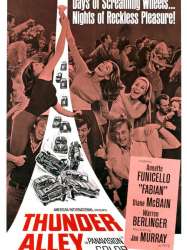
Thunder Alley (1967)
, 1h29Directed by Richard Rush
Origin USA
Genres Drama, Action, Romance
Themes Sports films, Transport films, Films about automobiles, Auto racing films
Actors Annette Funicello, Fabian Forte, Diane McBain, Warren Berlinger, Jan Murray, Stanley Adams
Rating53%





Le pilote de stock-car Tommy Callahan est contraint de rejoindre le cirque motorisé de Pete Madsen car il a causé un accident mortel lors d'une course après avoir eu un blackout. Il apprend à Francie, la fille de Pete, et à son copain Eddie Sands tout ce qu'il sait sur la conduite automobile. Eddie apprend vite et il est séduit par Annie Blaine, l'ex-copine de Tommy, après avoir gagné sa première course. Tommy et Eddie deviennent de féroces rivaux lors de la course suivante, au cours de laquelle Tommy fait équipe avec Francie et se remémore la cause de ses blackouts.
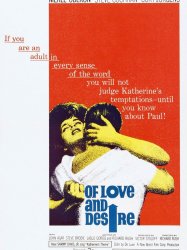
Of Love and Desire (1963)
, 1h34Directed by Richard Rush
Origin USA
Genres Drama
Actors Merle Oberon, Curd Jürgens, Steve Cochran, John Agar, Steve Brodie, Eduardo Noriega
Rating51%





American engineer Steve Corey moves to Mexico to work at one of the mining projects owned by Katherine Beckman and her half-brother Paul. He finally is introduced to Katherine, and the man that he is taking over for, Bill Maxton, informs tells him that Katherine is his for the taking: "All you have to do is touch her---she goes off like fireworks. There were plenty of guys before me, and there'll be plenty after me."
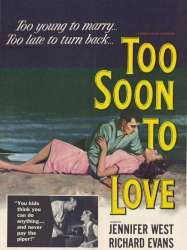
Too Soon to Love (1960)
, 1h25Directed by Richard Rush
Origin USA
Genres Drama, Melodrama, Romance
Themes L'adolescence, Films about children, Pregnancy films, Films about sexuality, La sexualité des mineurs
Actors Merle Oberon, Curd Jürgens, Richard Evans, Richard Evans, Jack Nicholson, Ralph Manza
Rating51%





Cathy Taylor et Jim Mills, deux adolescents, voient leur amour contrarié par l'attitude du père de Cathy. Ils continuent cependant à se voir à son insu mais bientôt Cathy tombe enceinte. Ils décident ensemble qu'il vaudrait mieux qu'elle avorte, mais ils n'ont pas l'argent pour payer le médecin...
Scriptwriter

Air America (1990)
, 1h52Directed by Roger Spottiswoode
Origin USA
Genres Drama, Comedy, Action, Adventure
Themes Politique, Transport films, Aviation films, Political films, Buddy films
Actors Mel Gibson, Robert Downey Jr., Nancy Travis, David Marshall Grant, Michael Dudikoffi, Ken Jenkins
Rating58%





In late 1969, Billy Covington (Robert Downey Jr.) works as a helicopter traffic pilot for a Los Angeles radio station, but after breaking several safety regulations on the job, the U.S. Federal Aviation Administration suspends his pilot's license. His piloting skills, bravery and disregard for the law are noticed by a mysterious government agent, who tells Billy that he can get his license back if he accepts a job in Laos, working for a "strictly civilian" company called Air America. The stranger indicates the air mission in Laos is "Top Secret" and the fact that American soldiers are stationed in Laos is a cover-up.
 Connection
Connection

